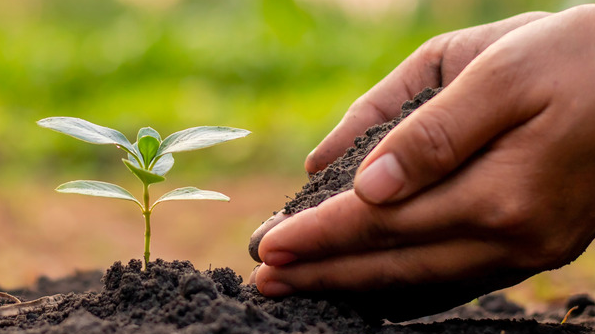Soil is super important because it’s like the home for plants. It’s where they grow and stay healthy. The type of soil you use can either help your garden succeed or make it struggle. It affects how well your plants grow, how much food you get from them, and how safe they are from bugs and diseases.
This article will discuss why soil matters so much in gardening and how it makes a big difference in how plants grow.
Understanding Soil Basics
To understand soil better, this part will talk about what it’s made of, how it feels, and its pH levels.
Mineral Composition
Soil is mostly a mix of tiny bits from rocks that have been worn down over time, kind of like sand on a beach. These bits make the soil strong. There are also nutrients from old plants and tiny creatures. These nutrients make the soil healthy because they give food to plants and help keep water in.
Soil Texture
The way soil feels is important too. Some soil is like rough sand that lets water run through really fast. Some feel smooth like flour and keep water better. There’s soil that’s like sticky mud and holds onto water a lot, but it can get too wet.
pH Levels
Soil’s acidity or alkalinity matters. Acidic soil (pH < 7) limits nutrients and may need lime. Neutral soil (pH = 7) suits most plants. Alkaline soil (pH > 7) can restrict nutrient access and may need acidification.
Assessing Your Garden’s Needs
Picking the proper plants is crucial. Make sure the plants you choose match the type of soil you have because different plants prefer various types of soil. If your soil isn’t ideal for the plants you’ve chosen, you can improve it by adding things like compost. You may create a garden that works well for the plants you wish to grow by following these instructions.
Vegetable Gardens
To make veggies happy, they need organic super soil that’s rich in nutrients and drains water well, like loam or sandy loam. With that in mind, to get your soil ready, clear out weeds, check the soil’s pH, add compost or manure to make it healthy, and make sure it doesn’t get too soggy.
Flower Gardens
Flowers like soil that’s not too wet and has lots of air in it so their roots can grow strong. To help your flowers, check the soil’s pH and nutrients, put in compost to make it better, use mulch to keep the soil comfy, and pick flowers that match your soil type.
Herb Gardens
Herbs like soil that’s a bit on the basic side and drains well. To make a good home for herbs, fix drainage issues, keep the pH between 6.0 and 7.0, add compost for food, and trim your herbs often.
Container Gardening
When you’re gardening in pots, you need special soil that lets air and water in. Use soil made just for pots. Make sure the pots have holes for water to drain out, check the soil to know when to water, give fertilizer when needed, and move where your pots get sun.
Soil Maintenance and Improvement
Taking care of the soil is important for successful gardening and farming. Here are three key things you need to do to make sure your soil stays healthy and good for growing plants.
1. Soil Mulching
Mulching is covering the ground with things like wood chips or plastic. This helps the soil in many ways. It keeps water in, stops annoying weeds from growing, makes sure the soil doesn’t get too hot or cold and prevents the soil from washing away when it rains. When picking mulch, think about where you live, what plants you’re growing, and what you like.
2. Fertilizing the Soil
You add special stuff called nutrients to the soil, like nitrogen, phosphorus, and potassium. This helps your plants grow strong and gives you more and better crops. You can choose different kinds of food for your soil, like synthetic minerals or natural fertilizers such as compost or manure. To pick the right one, you should check your soil, think about what your plants need, and be mindful of the environment.
3. Aerating the Soil
Just like you need fresh air to breathe, the soil needs air too. Soil aeration is like opening a window for the soil. It helps plant roots get oxygen, drink water, and eat nutrients. You can do this by digging or using special tools. How often you should do it depends on your soil and how compact it feels.
Troubleshooting Soil Choices
Remember, the right soil is like the foundation of your garden. If you keep learning and trying new things, your garden will grow and look amazing.







